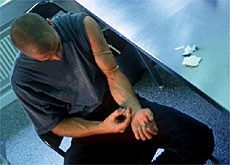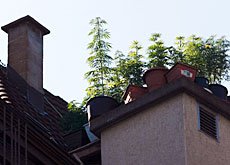Government warns against cannabis legalisation

Interior Minister Pascal Couchepin says Switzerland could be in violation of international rules if voters in November approved a proposal to decriminalise cannabis consumption.
The government’s drugs policy is among several issues which will come to a nationwide vote on November 30.
Couchepin, who is in charge of health and social security matters, was speaking on Monday at the launch of the government’s campaign in the run-up to the ballot.
In addition to criticising two moves that would change the current policy on drugs, he also urged voters to reject a proposal by trade unions to introduce a flexible retirement age at 62.
Couchepin said the hemp initiative had come too soon after parliament rejected a similar proposal in 2004.
“Parliament needs more time to find a solution,” he said.
He also said the initiative was sending a conflicting message at a time when moves are underway to ban smoking in public places, including restaurants.
He called for heroin prescription to be enshrined in law despite opposition by the Rightwing and advocates for complete abstinence.
Drug policy
The legalisation of cannabis could pose problems for Switzerland in the context of international conventions, according to Couchepin.
The proposal foresees the legalisation of psychoactive hemp for personal consumption, while trade and production would be under government control.
Four years ago, the House of Representatives voted down plans by the government to decriminalise cannabis. The Senate, however, had come out in favour.
Couchepin urged voters to accept instead a proposal which would enshrine in law the government’s own drugs policy, which is based on the four pillars of prevention, therapy, repression and damage limitation.
As part of the amendment, trials with heroin prescription for addicts underway since 1994 will be given a legal basis.
However, rightwing and groups campaigning for complete abstinence challenged the law and have forced a nationwide vote on the matter.
Old age pension
Voters will also have the final say on a proposal by trade unions to introduce a flexible retirement age at 62. It is currently 65 for men and 64 for women.
But the government has dismissed the plan as a too expensive, unsocial and too bureaucratic.
“The initiative is a misnomer. It really aims to lower the retirement to 62 for everybody. This is against the general trend and we would be the only country in Europe,” said Couchepin.
He warned that the main beneficiaries would not be low-paid workers, but the average earners and that the social security scheme would be burdened with additional SFr1.5 billion ($1.4 billion) in pension payments a year.
Couchepin argued that average earners could already afford early retirement now as a result of Switzerland’s three-tier pension system and those with low salaries, notably in the construction sector, benefit from special regulations.
He said the administration would also face a difficult task in checking whether those who had taken early retirement had not taken on a job.
The initiative by trade unions and supported by centre-left political parties was launched as parliament is discussing proposal to raise the retirement age for women to 65.
The unions want everybody who earns less than SFr120,000 a year to be able to take early retirement, saying the option should not be limited to the rich.
swissinfo, Urs Geiser
Voters will have the final say on five issues on November 30.
The electorate is to decide on proposals to decriminalise the consumption of cannabis and to enshrine in law the prescription of heroin to addicts.
On the agenda are also proposals to introduce a flexible retirement age at 62 without cutting pension allocations.
A people’s initiative calls for the indefinite extension of the statute of limitations for paedophile criminals.

In compliance with the JTI standards
More: SWI swissinfo.ch certified by the Journalism Trust Initiative












You can find an overview of ongoing debates with our journalists here . Please join us!
If you want to start a conversation about a topic raised in this article or want to report factual errors, email us at english@swissinfo.ch.